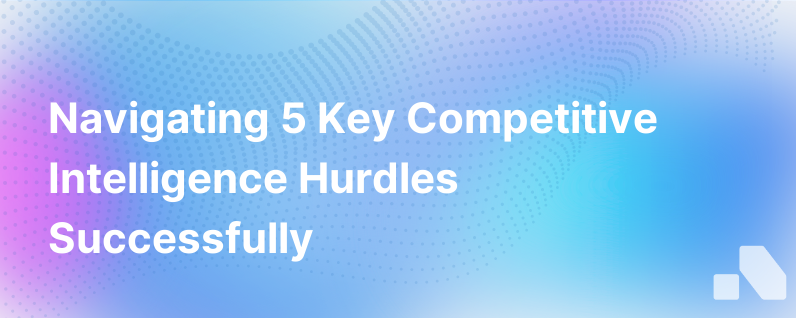
In today's hypercompetitive business landscape, “information is power” rings more true than ever. Competitive intelligence (CI) is a strategic tool companies use to gather and analyze information about their competitors. However, effective CI collection presents several challenges. In this article, we will highlight five of these challenges and suggest ways to address them.
Data Overload
We are living in an age of information surplus where data is continually produced and readily available. While data is a vital component for CI, too much of it can become overwhelming and hinder the analysis process.
To minimize data overload, it's important to have a clear understanding of what information is needed. Start off with questions you're trying to answer and use those to guide your data collection. It's essential to remain focused on quality, rather than quantity. Specialized AI tools like Aomni can help, by aggregating and synthesizing the most relevant data.
Timeliness of Information
In a rapidly changing market, CI needs to be collected and analyzed in near real-time for it to maintain its relevance. Timely access to CI can be the difference between capitalizing on an opportunity or missing it altogether.
One way of ensuring timely information is by using technology to your advantage. AI and automation tools can help in continuously monitoring competitive developments, updates, and news.
Legislation and Ethical Constraints
Another challenge lies in the collection methods used for CI. There are legal and ethical guidelines that must be adhered to when gathering CI. Violating these can lead to severe consequences, from legal repercussions to harm to the company's reputation.
Companies must ensure they have a thorough understanding of the laws and ethics governing CI collection in their respective regions. A robust CI ethics policy should be developed and thoroughly communicated to all team members.
Interpreting and Understanding the Data
Simply having CI is not enough; what you do with it is what counts. Interpreting and understanding data is a considerable challenge. Misinterpretations can lead to misguided strategies, causing potential detriment to the company's performance in the long run.
To significantly deliver accurate interpretations, it is key to have both skilled analysts in your team and AI tools that turn raw data into compelling insights. Incorporating an AI tool can help identify patterns and trends, making data interpretation more straightforward.
Organizational Integration
Collecting CI and generating insights are of no avail if not effectively integrated into the company's operations and strategy development. Often, the CI team works in solos, far removed from decision-makers. They produce thoughtful reports, only for them to be neglected or not read at all.
Integration of CI requires open communication channels between CI teams and decision-makers. The company culture must also foster and value intelligence-based decisions. A culture of learning and insight sharing can facilitate better adoption and implementation of findings.
In conclusion, competitive intelligence is not without its challenges. A successful CI operation comes from correctly identifying these challenges and implementing strategies to overcome them. Data overload, timeliness, legal and ethical constraints, data interpretation, and organizational integration, are all complexities inherent in CI operations. However, with the right tools, resources, and strategies, companies can navigate these to build an efficient and effective CI practice that drives strategic decisions. Solutions like Aomni's AI-powered platform can help substantially in overcoming these barriers, delivering real-time insights customized for every user.